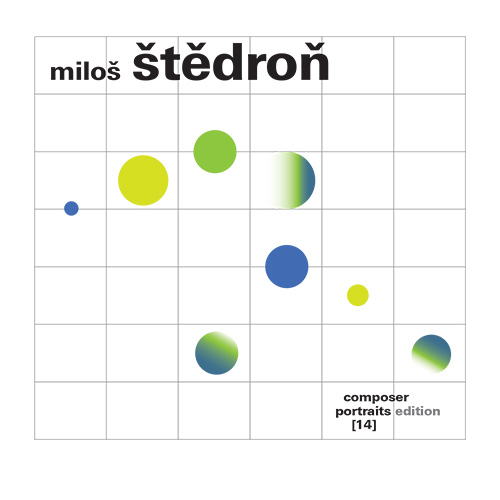Portrait of the composer Miloš Štědroň.
CD on Bandcamp.
(*1942)
Miloš Štědroň is a Czech composer, musicologist, and pedagogue. He studied musicology and Czech literature at the Faculty of Arts of the J. E. Purkyně University in Brno and composition at the Janáček Academy of Performing Arts. He has been a lecturer at the Masaryk University in Brno since 1974 and was named Professor in 1994. He is a leading expert on Janáček and the music of Claudio Monteverdi. He has written over four hundred classical pieces and is also a highly sought-after composer of incidental music and music theatre, among the best known of which are his musicals Balada pro Banditu (A Ballad for a Bandit) and Pohádka máje (May Fairy Tale). He is a multi-faceted figure on the Czech musical scene, including academia and the theatre world, early and new music, musicological conferences and the popularisation of music, Monteverdi and Janáček. He operates in all these world with lightness, humour, humanity, and erudition. It is precisely these words that best characterise his work as a composer. We find in Štědroň’s works suggestions of Moravian and Roma folk music, as well as Medieval and Baroque music. Most of his pieces were written specifically for Czech performers and groups (the vocalist and actress Iva Bittová, harpsichordist Barbara Maria Willi, Due Boemi di Praga, the Brno Radio Orchestra of Folk Instruments, the Gustav Brom Orchestra, the Brno Madrigalists, and others). Also significant is Štědroň’s activity in musical reconstruction. Along with the composer Leoš Faltus, they prepared for performance and publication unfinished works by Janáček (the Danube Symphony, the violin concerto, the Intimate Letters string quartet). Along with composer Arnošt Parsch, he produced operas including Caccini’s Euridice and Monteverdi’s L’incoronazione di Poppea.
1 Witchcraft____2:07
Iva Bittová – voice, Jiří Stivín – flutes, Vladislav Bláha – guitar
2 Trium vocum____7:44
Jiří Stivín – flute, Michaela Fukačová – cello, Alan Vitouš – percussion
3–16 Lupi____6:25
Affetto Vocal Ensemble (Marek Olbrzymek, Vladimír Richter, Aleš Procházka)
3. Lupi matutini
4. Tyranni, exactores, principes, barones
5. Pauperum, ecclesiarum et monasteriorum oppressores, gregem dominicum invadentes
6. Tyranni, exactores, principes, barones
7. Lupi matutini
8. Lupi meridiani
9. Heretici
10. Et ypocrite, quorum plenus est mundus
11. Lupi meridiani
12. Lupi vespertini
13. Id est diaboli, rapiunt et dispergunt oves
14. Lupi vespertini (villanella)
15. Lupi nocturni
16. Tu, pastore magis in opus istud agis
17–21 Affetti banalissimi____8:34
Trio Aperto (Barbora Šteflová – oboe, Jan Charfreitag – clarinet, Pavel Horák – bassoon)
17. Affetti
18. Solis praevia
19. Soli
20. Menuet
21. Fresco
22 Austerlitz for four cellos____7:38
Jan Škrdlík – violoncello
23 Memorial Ceremony to Pasternak____9:44
Jana Boháčová – oboe, Jaromír Hnilička – trumpet, Brno Madrigal Singers, Josef Pančík – choirmaster
24-35 Villanelle per Willi____13:13
Barbara Maria Willi – harpsichord, Štěpán Graffe, Jan Vašta – violins, Jan Škrdlík – cello, Ctibor Bártek – percussion
24. Praembulum
25. Villanella I
26. Color I
27. Five Segments
28. Sarabanda
29. Fresco
30. Villanella II
31. Color II
32. Ricercar
33. Color III
34. Chorea
35. Villanella III
36-38 Madrigals and Villanelles on Švejk (excerpts)____4:22
Affetto Vocal Ensemble (Jan Mikušek, Marek Olbrzymek, Vladimír Richter, Aleš Procházka), Martin Jakubíček – piano
36. Dear Heinrich was definitely in an ugly situation
37. Dear Katy
38. Kraus von Zillergut
39 Jazz Ma Fin____6:57
Gustav Brom Orchestra, Gustav Brom – conductor
40-51 AD: Allegria e Nostalgia____11:04
Dagmar Pančochová – piano, Brno Philharmonic Orchestra, Jakub Klecker – conductor
40. MM 104
41. MM 90 Dumka
42. MM 90–104 Cadenza banalissimo
43. MM 108-112
44. MM 90 Cadenza “DASCHA”
45. MM 112
46. MM 90
47. MM 90
48. MM 75–80
49. MM 104–112
50. MM 160 Furiant Con brio vivacissimo
51. MM 104–112 Finale

